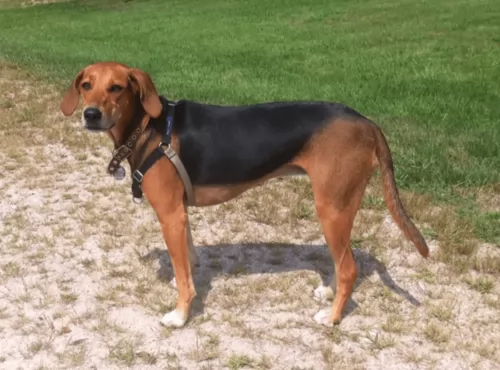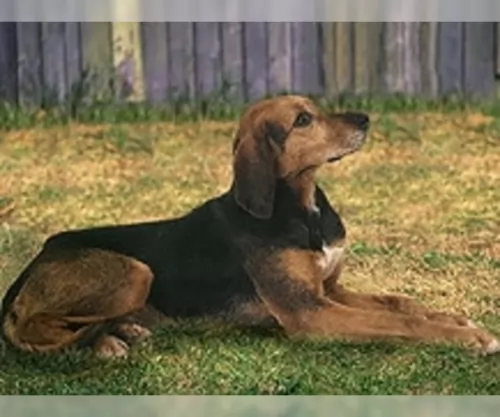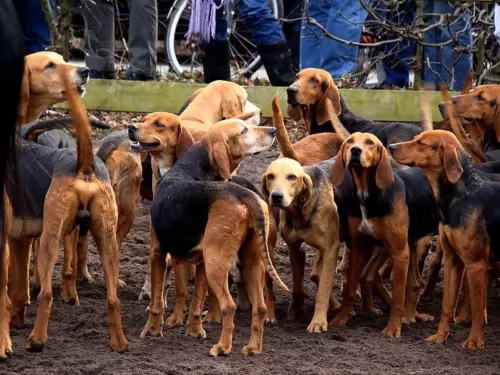 Petzlover
Petzlover Kerry Beagle is originated from Ireland but Norwegian Lundehund is originated from Norway. Kerry Beagle may grow 21 cm / 9 inches higher than Norwegian Lundehund. Kerry Beagle may weigh 18 kg / 40 pounds more than Norwegian Lundehund. Both Kerry Beagle and Norwegian Lundehund has same life span. Both Kerry Beagle and Norwegian Lundehund has almost same litter size. Kerry Beagle requires Low Maintenance. But Norwegian Lundehund requires Moderate Maintenance
Kerry Beagle is originated from Ireland but Norwegian Lundehund is originated from Norway. Kerry Beagle may grow 21 cm / 9 inches higher than Norwegian Lundehund. Kerry Beagle may weigh 18 kg / 40 pounds more than Norwegian Lundehund. Both Kerry Beagle and Norwegian Lundehund has same life span. Both Kerry Beagle and Norwegian Lundehund has almost same litter size. Kerry Beagle requires Low Maintenance. But Norwegian Lundehund requires Moderate Maintenance
 The Kerry Beagle is an ancient dog breed, thought to go back as far as the 16th century and looked upon as one of the oldest of all the Irish dog breeds. The dog was introduced to Ireland by the Celts.
The Kerry Beagle is an ancient dog breed, thought to go back as far as the 16th century and looked upon as one of the oldest of all the Irish dog breeds. The dog was introduced to Ireland by the Celts.
It is believed to have descended from the Old Southern Hound or Celtic Hounds.The Kerry Beagle was taken by Irish immigrants to America and is a foundation breed in the development of the Coonhound for hunting and scenting.
The Kerry Beagle isn't recognized by the AKC but has been recognized by the Irish Kennel Club in 1991. It is still rare outside of Ireland and it hasn't been recognized by major kennel clubs.
 The Norwegian Lundehund hails from the island of Vaeroy, Norway and was created for the purpose of puffin hunting.
The Norwegian Lundehund hails from the island of Vaeroy, Norway and was created for the purpose of puffin hunting.
Now that these puffins are a protected species, the dog is no longer used for hunting and has become a companion dog.
The breed decreased in numbers during- and after World War II because the islands where he came from had an outbreak of distemper. It was in 1963 that another outbreak occurred and the dogs were almost wiped out. A breeding program saw their numbers being built up.
It was in 2011 that the dog was recognized by the American Kennel Club.
 The Kerry Beagle is a medium sized dog with a solid physique. He stands at about 56 – 61cm and weighs between 22 and 27kg. He has a broad head with drop ears. His eyes are large and deep set and are a yellow to brownish color, giving the dog an intelligent expression.
The Kerry Beagle is a medium sized dog with a solid physique. He stands at about 56 – 61cm and weighs between 22 and 27kg. He has a broad head with drop ears. His eyes are large and deep set and are a yellow to brownish color, giving the dog an intelligent expression.
His coat is short and the most common color for this dog is black and tan, but you can also find tan and white or some blue mottling as well. He is a lean, muscled dog with a deep chest and legs which are slim and long, providing the dog with the ability to pick up speed on a hunt. The tail of the dog is long and slightly curved and carried level.
As a packhound this dog is a serious hunter. He may look aggressive as he goes after his prey but he is actually a calm, well-balanced, friendly dog who forms a strong, loving relationship with his human family.
He is also gentle and playful with children in the home and also gets on well with other dogs too. He is intelligent and will readily respond to training and socialization. It's a dog that just loves being outside, especially when there is something to do, such as playing ball games or going on a long walk.
He is alert and inquisitive and makes an excellent watchdog. A home with a good sized garden will be ideal for the Kerry Beagle, though it can be kept in small gardens in the city too, just so long as he is given the opportunity for daily exercise.
 As a spitz-type dog, with the Lundehund you’ll recognize the typical spitz-dog characteristics – the erect ears and the tail that curves over the back.
As a spitz-type dog, with the Lundehund you’ll recognize the typical spitz-dog characteristics – the erect ears and the tail that curves over the back.
He is a small to medium sized dog standing at 30 – 40cm and weighing 6 – 9kg. He is an active dog and is as agile as a fox.
He has a dense double coat which is white, reddish/tan with some black tips. He is a dog which sheds constantly.
Strangely this dog has 6 toes and his rear pads have elongated foot pads which have helped the dog be able to climb over rocks. He also has a flexible type of neck that is capable of craning back so that the head touches the spine. The dog has some unique features and wriggling in and out of small spaces is another of his characteristics. In fact he can do things that you would not imagine a dog could do.
When you have a Lundehund in your life you’ll agree he has a happy, amicable personality. He is non-aggressive.
He will require training and socialization as he is an independent dog who can be obstinate. He is quite aloof with strangers too and once he starts barking at them he tends to want to continue. Training him will put an end to that irritating behavior. He is a loving, loyal dog, enjoying the company of his human family.
 The Kerry Beagle may well be quite an aggressive dog when showing off his hunting skills, but when it comes to being around his human family, he softens up and becomes a gentle, loving friend.
The Kerry Beagle may well be quite an aggressive dog when showing off his hunting skills, but when it comes to being around his human family, he softens up and becomes a gentle, loving friend.
He is an affectionate playmate for children and also gets on well with other dogs you may have in the home.
Your Kerry Beagle is alert, intelligent and active, and when you have one of them as a 4-legged family member, you'll discover what a wonderful, devoted companion he can be.
 The Norwegian Lundehund isn’t your everyday dog and in fact he is known as a primitive breed. Perhaps he wouldn’t be the best dog to have if you’re a first-time dog owners as training is quite difficult too.
The Norwegian Lundehund isn’t your everyday dog and in fact he is known as a primitive breed. Perhaps he wouldn’t be the best dog to have if you’re a first-time dog owners as training is quite difficult too.
People who are willing to take a chance on him say that with training and socialization he can become a loving canine companion.
 If your Kerry Beagle is ill or injured you need to get him to the vet for a full assessment. As a puppy he will also need certain vaccinations to protect him from some life-threatening illnesses as well as getting de-wormed.
If your Kerry Beagle is ill or injured you need to get him to the vet for a full assessment. As a puppy he will also need certain vaccinations to protect him from some life-threatening illnesses as well as getting de-wormed.
Bad smelling breath is a symptom that your pet's teeth need checking. If you're not sure how to maintain his teeth, make sure your Kerry Beagle has professional dental cleaning to ensure his gums and teeth are kept in a healthy state. Your vet will give you advise on how to watch for periodontal disease.
In hot weather particularly, check your dog over for fleas and ticks and remove them.
Heartworm is a fatal disease which which can affect your dog. Speak to your vet about treatments as living in a hot, wet area opens you pet up to bites from infected mosquitoes.
 The Lundehund is prone to digestive disorders but even so he has got a good chance of living to be 11, 12, 13 or 14 years of age with good care.
The Lundehund is prone to digestive disorders but even so he has got a good chance of living to be 11, 12, 13 or 14 years of age with good care.
He is however, one of these dogs prone to health problems of which chronic intestinal disease is one. Its the kind of illness that can recur because it is resistant to treatment.
Experts on these dogs say that they should have a fecal test done every 6 months or so, saying that one thing a bit negative with this dog breed is that you may well be forking out quite a bit on chronic veterinary care.
 Because of the short coat of the Kerry Beagle, he is looked upon as a low maintenance dog. He doesn't shed very much, and simple grooming is required such as brushing the coat twice a week.
Because of the short coat of the Kerry Beagle, he is looked upon as a low maintenance dog. He doesn't shed very much, and simple grooming is required such as brushing the coat twice a week.
His nails will also need to be clipped, as left long, they can hook on things and rip your pet's flesh.
You will need to check his teeth and also check inside his ears. Dogs with floppy ears are more prone to infection in the ears and this can cause terrible pain for your pet.
If you keep your Kerry Beagle as a hunting dog, you will know that active dogs like these have different dietary requirements to companion dogs.
All that activity requires top quality nutrition and a certain amount of calories. If you're buying dry kibble, make sure its the highest quality so that he doesn't require huge portions to satisfy him. Leading canine nutritionists recommend a hunting dog like this be fed a large meal once a day and preferably in the evening, after all the hunting action.
 Like any other dog, the Norwegian Lundehund will do well on the best quality food. If you buy him commercially manufactured food, check the ingredients on the packaging. Lots of these lower quality foods are made from ingredients that are toxic for your pet, so buy a good quality one.
Like any other dog, the Norwegian Lundehund will do well on the best quality food. If you buy him commercially manufactured food, check the ingredients on the packaging. Lots of these lower quality foods are made from ingredients that are toxic for your pet, so buy a good quality one.
Buy food according to your dog’s age and activity levels. To make his meals more interesting, add in some delicious home prepared food for him. Stay away from spicy, exotic foods and go for something like boiled chicken, brown rice and vegetables. Some raw meat added to the kibble from time to time can also do wonders for your pet as he requires a high-protein diet. Make sure he always has access to fresh, cool water.
Other ‘caring’ things to do to make sure your pet has a quality lifestyle is -
Brush his hair twice a week as he is a fairly heavy shedder. Not only does it keep the coat nice and shiny, it builds up a bond between you and your pet.
Check his ears and eyes regularly to make sure they are free from infection.
Clip his nails when they get long as your pet can hurt himself if the nails hook onto things.
Whenever he is ill, get him to the vet for a check-up.
Make sure he has a nice safe, dry, warm, snug place to sleep.
Keep him well exercised. A dog that is put into the backyard and more or less forgotten will be most miserable. Why get a pet if you don’t want to make him a 100% part of the family?